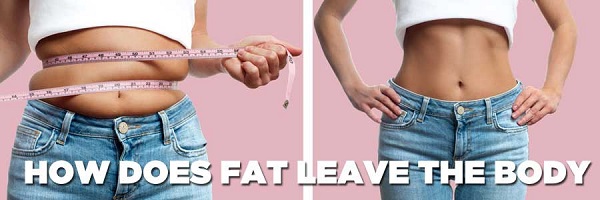How Does Fat Leave the Body?
How Does Fat Leave the Body?

- Where Does Body Fat Go When You Lose Weight?
- Exhaled Pounds: How Fat Leaves the Body
- How Does Fat Leave the Body poop/fart
- How Does Fat Leave the Body during Weight Loss/on a low carb diet?
- How Does Fat Leave the Body after exercise/when dieting/workout?
How Does Fat Leave the Body? An Overview
When you lose weight, what happens to your body fat? Do you sweat it out, pee it out, or breathe it out? Yes, yes, and yes are the answers.
How on earth does this happen?
During fat metabolism or oxidation, triglycerides release fat as carbon dioxide and water atoms.
In other words, when you exhale, fat leaves your body as carbon dioxide. The fat that turns into water enters your circulation and is lost as urine, tears, sweat, and other bodily fluids.
What Is Fat?
In the human body, there are two types of body fat or adipose tissue. When fuel is scarce, white adipose tissue is primarily responsible for energy storage and the release of fatty acids.
This type of fat is mostly found in your body and is stored beneath the skin and around the organs. Visceral fat builds up around the organs, causing weight gain in the midsection. 2
Adipocytes are individual cells that makeup fat (cells that contain fat). The human body contains billions of fat cells of various sizes. White fat cells contain one large fat droplet that is surrounded by water, salts, and protein. The fat droplet is mostly made up of triglycerides (a molecule made of glycerol and three fatty acids).
How Does Fat Loss Work?
Excess energy consumed
Excess energy is stored in fat cells as triglycerides. This is how your body conserves energy for future use.
Over time, this excess energy leads to a fat surplus, which can have an impact on your body shape and health.
To lose weight, you must consume fewer calories than you burn. This is known as a calorie deficit
Though it varies by individual, a daily 500-calorie deficit is a good place to start for noticeable fat loss
Fats are released from fat cells and transported to the energy-producing machinery of your cells, known as mitochondria when you maintain a consistent calorie deficit. Here, the fat is broken down into energy via a series of processes.
If the calorie deficit persists, your body’s fat stores will continue to be used as energy, resulting in a reduction in body fat.
How Does Fat Expel From the Body?
The lungs are the primary organs responsible for fat removal in the body.
Fat leaves the body as carbon dioxide when you exhale, or as water in the form of urine or sweat during the energy conversion process.
67 Body fat does not convert to muscle or leave the body via the colon.
The Fat-Burning Process
The body converts fat into usable energy during the fat-burning process, causing the fat cell to shrink in size.
The stored fatty acids are degraded, releasing energy and converting them to carbon dioxide (CO2) and water (H2O).
This metabolic energy conversion also produces heat, which aids in temperature regulation.
If you’re carrying extra pounds, it means you’re consuming more energy than you’re using (calories are units of energy).
“The extra energy is stored in adipose tissue all over your body as triglycerides,” explains Dr. Burguera. Smaller amounts of energy are stored as glycogen in your liver and muscles.
How does your body make use of energy? More than you might think:
When you’re at rest; the heart requires energy to pump, the lungs to breathe, and the brain to think. (This is your basal metabolic rate.)
When you’re active; whether you’re just getting out of bed or running a marathon, your muscles require energy.
While you are eating; your digestive system requires energy to digest and store food.
What happens to body fat when you diet?
Dieting means consuming fewer calories than your body requires. As a result of the energy deficit, your body turns to fat reserves for energy.
Your body must eliminate fat deposits via a series of complex metabolic pathways.
Byproducts of fat metabolism exit your body in three ways: as water, through your skin (when you sweat), and through your kidneys (when you urinate).
As carbon dioxide, as it passes through your lungs (when you breathe out)
“Fat breakdown, on the other hand, liberates energy for biological functions and physical activity,” he explains.
“It also generates heat, which helps to maintain normal body temperatures.
“What happens to body fat when you exercise?
For energy, your muscles first use stored glycogen. “Your body starts burning mostly fat after about 30 to 60 minutes of aerobic exercise,” says Dr. Burguera. (This takes about an hour if you exercise moderately.)
Cardio should be done at least 30 minutes twice a week, according to experts.
Weightlifting and resistance training is also recommended. Increased muscle mass may assist you in burning more calories and increasing your basic metabolic rate.
Exercise also increases your respiratory rate, so you expel more CO2 when you exercise.
About exercise and weight loss
“Exercise is essential for weight loss and weight maintenance,” says Dr. Burguera.
However, it may take some time for the number on your scale to move, so be patient.
Everyone’s reaction to exercise differs: Some people lose weight while others maintain their weight, and a few may even gain a few pounds.
“In general, people who successfully lose and maintain their weight tend to be physically active — up to an hour per day,” he says. “It is strongly advised to engage in some form of exercise three times per week.”
Why is it so hard to keep weight off?
When you consume more calories than your body can burn, fat cells grow in size and number
When you lose fat, these cells shrink in size while remaining roughly the same in number.
Thus, the primary cause of changes in body shape is a reduction in the size not the number of fat cells
This also means that when you lose weight, fat cells remain, and if you don’t make an effort to keep the weight off, you’ll gain it back.
Some studies suggest that this is one of the reasons why many people struggle to maintain their weight loss

Tips to Promote Fat Loss
Physical activity is probably the best thing you can do to get your heart rate up and increase your oxygen intake, which can help promote fat loss when combined with a healthy, balanced diet full of nutrient-dense foods.
Remember that you must still burn more calories than you consume in order to create a calorie deficit and lose weight.
Exercise boosts your metabolism or the rate at which your body uses energy.
Other basic suggestions for increasing your metabolic rate and reducing body fat include:
- Involve your children in active playtime.
- Park further away and walk further.
- Instead of sitting, stand at your computer.
- Avoid being a couch potato over the weekend by staying active.
- Instead of taking the elevator or escalator, take the stairs.
- Take short walks and stretch during your work breaks.
- Involve the entire family in a kickball game or go on a family hike.
- Get a restful night’s sleep.
Summary
Fat is an essential component of the human body that provides us with energy. While some fat is beneficial to our health, white fat stored around our organs and midsection can increase our risk of disease.
When we burn fat, it does not completely disappear.
It is converted into energy and expelled as CO2 and water, shrinking fat cells and changing body composition. Eating a healthy protein-rich diet and engaging in regular high-intensity exercise and strength training are the best ways to accelerate fat loss.
Burn Lab Pro, the World’s best fat loss support, can help you lose weight faster. This unique formula increases fat burning while retaining muscle mass for a more toned, defined physique by combining cutting-edge ingredients.
People also inquire.
When you lose weight, how does fat leave your body?
Your body must eliminate fat deposits via a series of complex metabolic pathways. The following byproducts of fat metabolism exit your body:
As water, through your skin (sweating), and through your kidneys (when you urinate). As carbon dioxide, as it passes through your lungs (when you breathe out).
How do you flush fat out of your body?
- Drink at least eight 8-ounce glasses of water per day.
- According to the University of Maryland Medical Center, avoid eating saturated and trans fats.
- Include a daily milk thistle supplement in your diet.
- Consume oranges or other citrus fruits on a regular basis. Oranges are high in vitamin C and provide a metabolic boost to the body.
What are the signs that your body is attempting to burn fat?
8 indicators that you’re losing weight
- You’re not hungry all the time.
- Your sense of well-being improves.
- Your clothes fit differently.
- You’re noticing some muscle definition.
- Your body measurements are changing.
- Your chronic pain improves.
- You’re going to the bathroom more or less frequently.
- Your blood pressure is coming down.
What does fat in urine look like?
Your urine may have an oily appearance as well as a milky white color.
This is because lymph fluid contains fat and protein. Blood in your urine is another symptom of chyluria.
People also wonder how fat leaves the body when they fart.
Does the fat come out as gas?
Fat is converted to carbon dioxide and water, which is the correct answer.
When you exhale the carbon dioxide, the water enters your circulation and is lost as urine or sweat.
If you lose 10 pounds of fat, 8.4 pounds will be expelled through your lungs, while the remaining 1.6 pounds will be converted to water.
Do you lose belly fat when you fart?
According to a popular Internet claim from 2015, one fart burns 67 calories, and 52 farts per day burn one pound of fat. That claim was later proven false.
But does the question have any merit? According to experts, farting is a passive activity that likely does not burn any calories.
How does fat exit the body via poop? How does fat leave the body poop?
The idea that you can simply poop out excess body fat is appealing, but that is not how your body works. Nobody would be overweight if it did.
Fat can occasionally be found in bowel movements, but this is dietary fat and may be caused by an inability to digest foods
How does belly fat leave the body?
During fat metabolism or oxidation, triglycerides release fat as carbon dioxide and water atoms. In other words, when you exhale, fat leaves your body as carbon dioxide.
The fat that turns into water enters your circulation and is lost as urine, tears, sweat, and other bodily fluids.
How does visceral fat leave the body?
The best way to reduce visceral fat is to lose weight and eat a healthy diet.
Diet and exercise work better on visceral fat than on hip fat.
Regular exercise can also help to keep visceral fat at bay.
Medication is another option, but studies show that it is not as effective as exercise in reducing visceral fat
Does fat leave the body through poop?
Though a bowel movement may make you feel lighter, it does not reduce body fat.
To lose weight, you must burn more calories than you consume through exercise and smaller, healthier meals.
Pooping is a simple process in which you eliminate food from your body
How does fat leave the body after exercise?
The fat that turns into water enters your circulation and is lost as urine, tears, sweat, and other bodily fluids.
As a result, exercise is an essential component of weight loss because your body disposes of fat through sweat, urine, and exhaled air.
How does fat leave the body Reddit
The simple answer is that you exhale them. CO2 exits the body near the end of the Electron Transport Chain, which your body uses to obtain energy from food.
The correct answer is that it is eventually converted to primarily carbon dioxide and exhaled.


